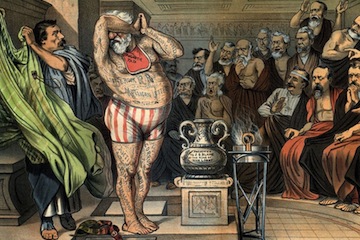Grover Cleveland, Mugwumps, and the 1884 Election
The Presidential Election of 1884 was the first after the Civil War to be won by a Democrat. Grover Cleveland won a narrow victory over James Blaine with the help of a group of voters called "mugwumps". These were Republicans who bolted from their party in response to corruption, and particularly to the past of Blaine. While Blaine had been connected with numerous scandals during his long political career, Grover Cleveland was known as a reformer of high integrity.
James Blaine was an experienced Republican politician who had served as Senator, Speaker of the House, and Secretary of State, and in a different environment he might have easily defeated a national neophyte like Cleveland. However, he also had numerous scandals in his past. In one case, he had written a letter arranging transactions to (effectively) accept a bribe from a railroad, which ended with the sentence "Kindly burn this letter."
Unfortunately for Blaine, the letter was not burned and it became a public sensation. As he was generally friendly to railroads and business interests, opponents made other attacks on Blaine in this area. When he became the nominee for President, a number of Republicans were outraged and gave serious attention to the Democratic contender. A famous political cartoon in Puck showed a picture of Blaine, half-undressed, with the names of numerous scandals and benefactors tattooed onto his body.
Grover Cleveland's entire political career was built upon his battles as an outsider, against corruption. He had served as nothing more than a county sheriff until 1882, when reformers persuaded him to run for Mayor of Buffalo. Within a year, he had parlayed his fights against that city's political machine into election as Governor of New York. In that position, he vetoed numerous bills and fought with the infamous Tammany Hall machine, to the point that his reputation as a reformer had become national. In the gritty era of the Gilded Age, many voters were desperate for a leader who would operate outside the prevailing culture of graft and kickbacks. The Democrats, who had not won a Presidential Election since 1856, sought to exploit this desire by nominating Cleveland.
When Cleveland's nomination became known, a sizable number of Republicans decided to bolt their party. They came to be known as mugwumps. Many of them were middle or upper class voters in the urban north, whose support would be vital to any Democratic victory. In every election since the Civil War, Republicans had dominated the northern states. Some prominent mugwumps included Mark Twain, Henry Ward Beecher, Carl Schurz, and a young Louis Brandeis. On the other hand, a young New Yorker named Theodore Roosevelt stuck with the Republicans in 1884, even though he fit the demographic profile of a mugwump in many ways. This loyalty would prove beneficial to Roosevelt in later years as he ascended the Republican hierarchy.
The name "mugwump" was applied to this group by newspaper publisher Charles Anderson Dana. It was a bastardization of an old Algonquin word, and was not used in a complimentary way. Dana suggested it meant someone who had their "mug" on one side of the fence, and their "wump" on the other. And indeed, the mugwumps brought Dana and the Republicans' worst fears to pass. Grover Cleveland won his home state of New York, and thus the election, by a total of 1,149 votes.
Some thought the mugwumps would become a permanent, moderate force in American politics. However, the term and the identity quickly died out. In large part, the movement was subsumed by other forces such as progressivism as the 19th century came to a close.
